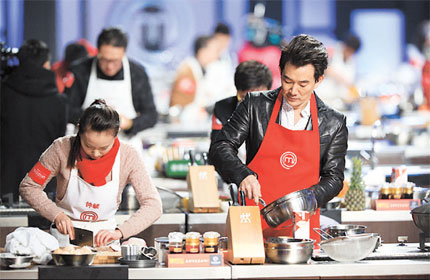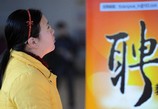
 |
| Contestants create dishes yesterday afternoon as an episode of the ongoing second season of Dragon TV's cooking reality show "MasterChef" was shot. (Shanghai Daily) |
Cooking shows are the newest recipe for TV success and profit.These shows tap into China's rich and varied cuisine, exploring new dishes, explaining ingredients, demonstrating techniques and recipes, and suggesting dishes and places to dine, both in China and around the country.
The shows are cheap and easy to produce, light-hearted and accessible to everyone, and there are many profitable spin-offs and by-products.
In Shanghai alone, around 10 cooking shows are broadcast, both local and produced by China Central Television and regional satellite TV channels.
And Chinese young people, who mostly grow up without having to cook for themselves, are taking a special interest.
Kevin Fan, a 30-something IT professional and a food enthusiast, gets tips for dining from these shows. He finds it fast, convenient and a good way to stay up to date with the latest food trends. He also picks up some easy recipes that he and his wife try at home.
"Food and emotions are tightly connected," Fan says. "Delicious food creates a sense of contentment and fulfillment. Making them on our own is more fun."
He and his wife are fans of "Hot and Scrumptious," which premiered in 2006, among others on Channel Young.
The five or so shows on that channel are among the most highly rated and popular among young professionals.
Last year, Channel Young food shows generated more than 150 million yuan (US$23.8 million) in advertising, and it's a huge growth area. Food TV ranks No. 1 in attracting advertisers, more than fashion and style shows. Food shows accounted for more than one-fourth of the channel's advertising revenue, according to director Bao Xiaoqun.
"Despite the economic slowdown, food shows still attract a lot of advertisers in the fields of condiments, sauces, kitchenware and beverages during the commercial breaks," Bao says. "The shows have a loyal fan base who are no less enthusiastic than fans for shows featuring stars and celebrities."
The rising popularity of food shows is attributed to China's rich food culture, the shows' light-hearted themes, flexible business model and low production budget. Cooking shows cost far less than entertainment shows featuring celebrities, according to Bao.

















 At 75, he travelled in Europe; at 98, he got a master's degree; at 102, he published an autobiography.
At 75, he travelled in Europe; at 98, he got a master's degree; at 102, he published an autobiography.


![]()
